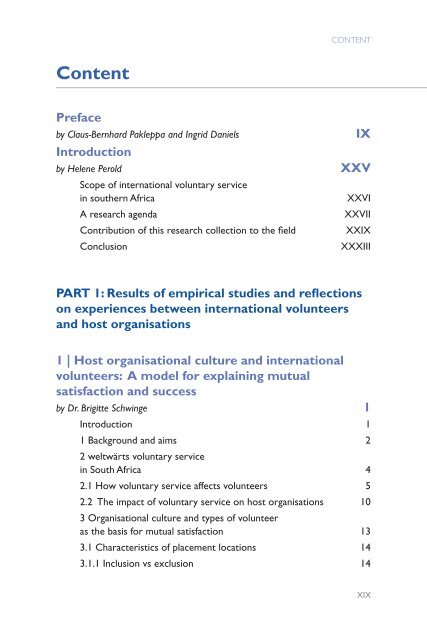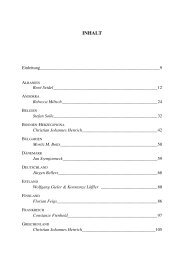Table of contents - scientia bonnensis
Table of contents - scientia bonnensis
Table of contents - scientia bonnensis
You also want an ePaper? Increase the reach of your titles
YUMPU automatically turns print PDFs into web optimized ePapers that Google loves.
Content<br />
Preface<br />
CONTENT<br />
by Claus-Bernhard Pakleppa and Ingrid Daniels<br />
Introduction<br />
IX<br />
by Helene Perold XXV<br />
Scope <strong>of</strong> international voluntary service<br />
in southern Africa XXVI<br />
A research agenda XXVII<br />
Contribution <strong>of</strong> this research collection to the fi eld XXIX<br />
Conclusion XXXIII<br />
PART 1: Results <strong>of</strong> empirical studies and refl ections<br />
on experiences between international volunteers<br />
and host organisations<br />
1 | Host organisational culture and international<br />
volunteers: A model for explaining mutual<br />
satisfaction and success<br />
by Dr. Brigitte Schwinge 1<br />
Introduction 1<br />
1 Background and aims 2<br />
2 weltwärts voluntary service<br />
in South Africa 4<br />
2.1 How voluntary service affects volunteers 5<br />
2.2 The impact <strong>of</strong> voluntary service on host organisations 10<br />
3 Organisational culture and types <strong>of</strong> volunteer<br />
as the basis for mutual satisfaction 13<br />
3.1 Characteristics <strong>of</strong> placement locations 14<br />
3.1.1 Inclusion vs exclusion 14<br />
XIX
XX<br />
3.1.2 Providing freedom <strong>of</strong> action<br />
vs expecting unquestioned compliance 16<br />
3.2 Characteristics <strong>of</strong> volunteers 18<br />
3.3 Volunteer coping strategies<br />
for dealing with conditions on location 19<br />
4 Summary and conclusion 22<br />
2 | The quest for healing and transformation:<br />
weltwärts as a contemporary dimension<br />
<strong>of</strong> the unfolding and deeply rooted relationship<br />
between South Africa and Germany<br />
by Rubert Van Blerk and Dr. Undine Whande 25<br />
3 | International volunteers and the development<br />
<strong>of</strong> host organisations in Africa: Lessons from<br />
Tanzania and Mozambique<br />
by Lauren A. Graham, Eddy Mazembo Mavungu and Helene Perold<br />
– with Karena Cronin, Learnmore Muchemwa and Ben Lough 31<br />
Scope <strong>of</strong> international voluntary service in southern Africa 32<br />
Researching international voluntary service in the South 34<br />
Conceptual issues in researching the contribution <strong>of</strong> IVS 36<br />
Overview <strong>of</strong> participating organisations 40<br />
Expectations and discourses –<br />
what shapes the international volunteer-host relationship? 42<br />
IVS’ potential to contribute to development objectives 45<br />
IVS and sustainable development 48<br />
Potential <strong>of</strong> IVS to contribute to individual development 50<br />
The potential <strong>of</strong> IVS to build social capital 53<br />
Barriers constraining the IVS potential<br />
for buildling social capital 56<br />
Recommendations 58<br />
Conclusion 59
CONTENT<br />
4 | Footprints <strong>of</strong> weltwärts volunteers<br />
in South Africa – A volunteer perspective<br />
from the SAGE Net weltwärts conference<br />
in South Africa, 17 November 2010<br />
by Niklas Rudolph, Tristan Kenedy et al 63<br />
But what exactly is expected from a weltwärts volunteer? 64<br />
5 | Think-tank on volunteering –<br />
An appeal from a volunteer-perspective<br />
by Sören Krüger and Jacob Birkenhäger 69<br />
Introduction 69<br />
Sustainability in the context <strong>of</strong> international volunteering 70<br />
Preparation Phase 70<br />
Volunteering phase 71<br />
Follow-up 72<br />
Practical advice for organisations and volunteers<br />
in the follow-up phase 74<br />
The weltwärts programme 74<br />
The sending organisation 75<br />
Other social organisations 76<br />
The volunteer 77<br />
6 | Biedermeier generation goes weltwärts:<br />
Young Germans’ attitude to life in 2010<br />
by Stephan Grünewald and Dr. Brigitte Schwinge 79<br />
“Generation ‘Biedermeier’: Fear <strong>of</strong> Failure”<br />
– Rheingold Youth Study 2010 79<br />
Fear <strong>of</strong> failure and desperate rage at the state <strong>of</strong> society 80<br />
Biographical catharsis: From wild and wasted<br />
to reasonable and responsible 80<br />
A parachute to placate fear <strong>of</strong> failure: Mania for order 81<br />
Voluntary self-regulation 81<br />
Squirrelling away skills 82<br />
XXI
XXII<br />
Shunning losers 83<br />
Maternal-media cocoons 83<br />
Beyond fear <strong>of</strong> failure – youth culture in the future 84<br />
The “Biedermeier generation” goes weltwärts.<br />
How do the Rheingold youth study and the SAGE Net<br />
research relate to one another? 84<br />
PART II: Action related refl ections<br />
and recommendations<br />
7 | Lessons learnt about reciprocity from<br />
research on intercultural training programmes<br />
and intercultural exchanges<br />
by Pr<strong>of</strong>. Dr. Alexander Thomas 89<br />
Psychology <strong>of</strong> intercultural exchange & lessons for reciprocity 89<br />
Main fi ndings from the SAGE Net study 2009/10 91<br />
Intercultural learning & competence in intercultural exchange 93<br />
Implications for SAGE Net’s volunteer programme 95<br />
8 | Participatory and Transcultural<br />
Quality Development within the<br />
weltwärts programme – Central<br />
fi ndings <strong>of</strong> an empirical study<br />
by Josef Freise, Jacqueline Alter and Ute Elisabeth Volkmann 99<br />
Introduction 99<br />
Starting position and research project approach 101<br />
Objectives and implementation <strong>of</strong> the research project 102<br />
Research project paradigms 102<br />
Project design: Qualitative research 103<br />
International working group 104<br />
Empirical fi ndings 104
CONTENT<br />
Defi nition <strong>of</strong> quality as a concept 105<br />
Quality models <strong>of</strong> the hosting organisations 107<br />
Infl uencing factors 108<br />
Determinants <strong>of</strong> quality: A resource-oriented perspective 112<br />
Volunteers as a human resource 112<br />
Volunteers as an economic resource 113<br />
Volunteers as a social resource 114<br />
Volunteers as a symbolic resource 115<br />
Volunteers as a cultural resource 116<br />
Quality dimensions 117<br />
Quality dimension: Pedagogical support 118<br />
The family approach 119<br />
The management approach 120<br />
The coaching approach 120<br />
The mentor as an integral part <strong>of</strong> quality development<br />
in pedagogical support work 121<br />
Quality dimension: Communication and partnership 121<br />
Models <strong>of</strong> cooperation and relationship builders 122<br />
Quality dimension: Structural and political aspects 125<br />
Conclusions and recommendations 126<br />
9 | Dialoguing Together – To enhance<br />
and improve the quality <strong>of</strong> the weltwärts<br />
programme in partnership<br />
by Susanne Saliger, Coordinator for Quality Management, ICJA 131<br />
Introduction 131<br />
Theoretical approaches to quality management<br />
in non-pr<strong>of</strong>i t organisations 132<br />
Quality 132<br />
Quality Management 133<br />
Quality management in international volunteer services 135<br />
Presentation <strong>of</strong> the international quality development<br />
process “Dialoguing together!” 136<br />
XXIII
XXIV<br />
ICJA Volunteersaustausch weltweit e.V.<br />
(ICJA Volunteer Exchange Worldwide PL) 137<br />
The role <strong>of</strong> the development aid programme weltwärts 139<br />
“Dialoguing together!” –<br />
A quality management project initiative 140<br />
Project objectives 141<br />
Process architecture and quality management components 142<br />
Joint development <strong>of</strong> a concept for international quality<br />
management within the context <strong>of</strong> the weltwärts programme<br />
(December 2010 – September 2011) 143<br />
Project target group 144<br />
Interim results and effects (March 2011) 145<br />
Outcome <strong>of</strong> the process so far<br />
(brainstormed by the ICG, 26 January, 2011) 146<br />
Conclusion: Action recommendations for the development<br />
<strong>of</strong> quality management in international volunteer service<br />
programmes 147<br />
Summary <strong>of</strong> action recommendations 149<br />
10 | Intercultural – Transcultural – Transhuman:<br />
Multiple belonging and connectivity<br />
in the 21st Century<br />
A conversation between Zena-Gabrielle Hailu<br />
and Undine Whande, 2009 – 2011 151<br />
Prelude 151<br />
Zena-Gabrielle Hailu 151<br />
Undine Whande 153<br />
Exploring transhumanity 155<br />
What does this mean for communication –<br />
intercultural, transcultural, transhuman? 158<br />
How does transhumanity work in practice? 161<br />
The Linguistic Aspect (Zena-Gabrielle in Germany, 2011) 161<br />
The Role <strong>of</strong> Memory (Undine in South Africa, 2011) 162
CONTENT<br />
Local and Global Simultaneities<br />
(Zena-Gabrielle in Germany, 2011) 163<br />
Being <strong>of</strong> many places and times (Undine in South Africa, 2011) 164<br />
What might the emerging transhuman realities<br />
look and feel like? (Zena-Gabrielle in Germany, 2011) 165<br />
Conclusion 167<br />
11 | Organisational development<br />
at CBO level in poor communities<br />
by Rubert van Blerk 171<br />
CBOs – a defi nition 171<br />
CBOs in the context <strong>of</strong> poverty 172<br />
CBOs and capacity development 174<br />
An alternative notion <strong>of</strong> organisational capacity 176<br />
Organisational development at CBO level 179<br />
Some recommendations for volunteer service 181<br />
12 | Research based recommendations for<br />
enhancing mutual satisfaction and success in<br />
international voluntary service – Drawn from<br />
the SAGE Net qualitative impact research on the<br />
German weltwärts programme to South Africa<br />
by Dr. Brigitte Schwinge and Claus-Bernhard Pakleppa 183<br />
Lessons learnt from ‘successful’ placements 186<br />
Research based recommendations 187<br />
Recommendations for SAGE Net Germany<br />
as a sending organisation 188<br />
Recommendations for the South African host organisation 191<br />
Listing <strong>of</strong> authors 195<br />
Programs <strong>of</strong> SAGE Net weltwärts conferences 201<br />
Extracts from the SAGE Net weltwärts policy 213<br />
XXV





![University Press [pdf] - scientia bonnensis](https://img.yumpu.com/499756/1/184x260/university-press-pdf-scientia-bonnensis.jpg?quality=85)